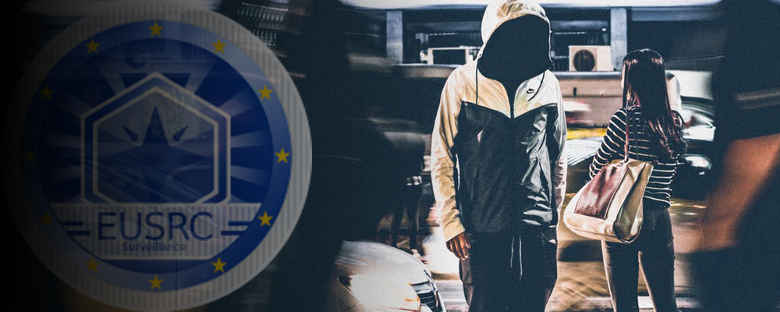EUSRC

EU Surveillance & Reconnaissance
Enabling officials to conduct surveillance and reconnaissance to regional and international standards.
The EU Surveillance & Reconnaissance Course (EUSRC) combines foundation and advanced technical and physical surveillance courses with specialist reconnaissance, covert entry and search programmes as prescribed by international and regional curriculum. Students learn progressive and technical surveillance, reconnaissance, defensive tactics, covert infiltration and exfiltration techniques. The course draws particular focus to regional and international standards, security and policy.
Introducing students to surveillance, the course takes students with an existing knowledge of intelligence to the position of recognised surveillance operators.
Target Audience
The course is oriented towards trained and experienced intelligence professionals operating in complex environments and has historically attracted the following representations. Therefore, in addition to the usual minimum requirements for all Institute training, applicants should also posses regional training in:
- intelligence on the operations, analysis or command track, equivalent to the EUIOC, EUIAC, EUIMC, or similar; and
- hostile environments equivalent to the EUHEC or similar.
| Internationals: Representatives from EU, UN and other international agencies, missions and institutions. | Nationals: National intelligence, military and law-enforcement delegates attending on behalf of European states. | ||
| Non-Profits: Functionaries in a position of public trust representing the media, NGOs, charitable and other third sector organisations. | Others: Professionals from the private sector, academia and other organisations. |
Learning Objectives
|
Surveillance Concepts: Understand the role of the surveillance operative and the function of surveillance and reconnaissance in intelligence. Understand surveillance methodology including the stages of surveillance, surveillance triggers, cover plans, exposure and more. |
|
|
Planning & Preparation: Plan reconnaissance, surveillance and surveillance detection operations. Prepare for deployment in various environments. Conduct operational briefings and debriefings, pre- and post- deployment. |
|
|
Progressive Surveillance: Progress from static observation posts (OPs) to foot and mobile surveillance applying stakeout, follow, handover, housing, pick up and other tactics and techniques for each. Conduct extended day and night operations in urban and rural environments. Develop contingency plans and compromise procedures fore units and operators. |
|
|
Technical Surveillance: Develop, deploy and operate improvised and manufactured covert technical surveillance devices for audio and video capture, location tracking, multispectral and other forms of covert collection. Maintain technical surveillance equipment in the field. Utilise technical support for disguise, props, cover and operational support. Penetrate communications networks and computer systems. |
|
|
Surveillance Detection: Understand surveillance threats, develop an awareness of surveillance activity and identify potential sources of surveillance. Deploy technical surveillance countermeasures (TSCM), anti-surveillance tactics and counter-surveillance where appropriate to ensure personal and operational security. Utilise tactics to detect when surveillance countermeasures are being deployed. |
|
|
Surveillance Equipment: Conduct surveillance photography using simple concealable and overt capture devices with optics. Employ video and audio capture from static and mobile positions. Communicate using surveillance radio procedure over a covert secure network. Employ common and specialised technical surveillance equipment as required. |
|
|
Reconnaissance: Conduct zone, area, route and close target reconnaissance (CTR) in various environments. Employ cover, camouflage and concealment to operators and equipment to avoid detection. Infiltrate, tactically move throughout an area of operations, construct/deconstruct a hide and exfiltrate. Utilise cover teams in reconnaissance, surveillance, surveillance detection and in support of other intelligence operations. |
|
|
Covert Entry & Search: Develop a covert entry and operational conduct action plan. Conduct lock and security reconnaissance and recognition. Identify security vulnerabilities for exploitation and bypass. Pick, strip and decode locks. Impression, cut and copy keys. Demonstrate urban and rural search techniques, including covert searches of persons, vehicles and premises. |
Course Format
The EU Surveillance & Reconnaissance Course is designed to develop regional skills and knowledge in the field of surveillance and reconnaissance. To develop these skills a variety of formats and delivery methods have been used including:
- Flexible Delivery: Workshops and exercises as well as traditional lectures.
- Blended Learning: The latest iteration of the course combines preparatory training via our e-learning platform with consolidated learning in an intensive attendance programme.
- Coaching & Mentoring: Career advice in the security sector from recognised experts, assistance and support with course content and sustained aftercare.
Part 1 - Distance Learning
Prior to attendance each candidate must complete a preparatory learning programme delivered over no less than two months. Candidates are free to sign up at any time and on their own schedule. Therefore, between April and July the following webinars and other online events will be delivered over a secure platform. These sessions are on the more sensitive information and practical training needed to conduct surveillance and reconnaissance throughout Europe. Each session is approximately 90mins in duration and most often scheduled during CET evenings and weekends to fit in with candidate's professional commitments.
- Induction & Tactical Terrain Analysis.
- Static Surveillance.
- Foot Surveillance.
- Mobile & Progressive Surveillance.
- Technical Surveillance & TSCM.
- Firearms Deployments.
- Rural Surveillance Methodology & Tactics.
- Observation Posts.
- Surveillance Detection I - III.
- Physical & Electronic Bypass.
- Operational Planning.
- Covert Search.
- Improvised Surveillance Devices.
- Disguise, Props & Operational Support.
- Technical Cover & Concealment.
- Computer Network Operations.
- Covert Operations Command (OTA*)
* Specialised optional training is offered with each of the Institute's courses. Although this extended training does not form part of the curriculum it is assessed and can offer candidates the opportunity to gain a more practical insight into a specific area of their training. These Optional Training Assessments (OTAs) are discretionary and may be offered at any point throughout the study cycle.
Part 2 - Residential School
After completion of the distance learning element in Stage I, an intensive residential school consolidates learning over five consecutive days. The majority of the school is Ex. THUNDERBOLT, a live training exercise and capability assessment during which candidates take on the role of surveillance operatives. Candidates must attend on-site in Vienna or Dublin to complete the school.

Day 1
Induction, Bypass & Surveillance Drill

Day 2
Fieldcraft & Reconnaissance

Day 3
Exercise Thunderbolt

Day 4
Exercise Thunderbolt

Day 5
Exercise Thunderbolt
Dates & Times
Candidates are free to sign up and begin studying at any time and on their own schedule. The residential school runs once a year, beginning on the third Monday in August and running for five consecutive days. Candidates may not be admitted to the residential school without having completed the distance learning element. Therefore, candidates should ensure they are enrolled by no later than the first week in April to provide sufficient time to complete distance-learning and access to all available scheduled events. Applications take approximately 4 weeks to process but security vetting may take up to 6 months to complete for applicants who lack a current security clearance.
Assessment
Assessment may be by any valid and accredited competency assessment meeting course requirements. However, competency is most commonly evidenced through the following combination of assessment methods:
- A pre-selection dossier including validated: security vetting, professional/academic reference checks, higher education certification (degree-level or equivalent), fitness/medical checks and evidence of a relevant career history and assessed knowledge in European security.
- A score of greater than 49% on the intelligence operations section of the MCPE or an equivalently balanced examination of similar content.
- Submission of a portfolio of work satisfying the criteria for at least a pass according to the candidate handbook.
- An approved assessor's independent testimony of observed competency across the surveillance domain of the Integrated Competency Framework (ICF) for Intelligence throughout at least 10 hours of supervised professional practice.
Standards
Credentials are fully accredited for compliance with international standards. For further details on Institute requirements, international standards and accreditation, view the Accreditation page.
Certification
The EQF Level 3 Award in EU Surveillance Operations accompanying this credential is earned after accruing 6 credits at approximately 60 guided learning hours.
Fees & Discounts
Not including accommodation, the course is delivered at a cost of €3000. Payment is accepted by bank transfer, card or PayPal. The following pricing options are available:
|
|
Member's Rate: If you have a current membership, log in with your user ID and password to receive a €150 discount when making your payment online. |
|
|
Group Rate: If you are booking on behalf of a group, further incentives may apply. Please contact the head of the training and directing staff for further details. |
|
|
Induction Fees: Candidates using the Institute to obtain a security clearance for the first time must also complete the Intelligence Security (INTSEC) awareness course. Those who have not studied with the Academy before must complete the Intelligence Foundations (INTFND) selection and induction course. Fees for these online short-courses are €350 and €150 respectively. |
Downloads
Location
Vienna or Dublin.
